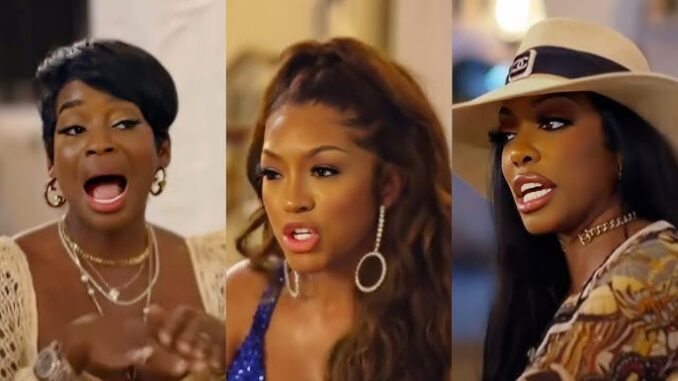
The Unfurling of the Peach: Shamea vs. Drew and the Symphony of Southern Scandal
The air in Atlanta, usually thick with the scent of magnolias and ambition, often carries another, more electric current: the hum of unfolding drama. Nowhere is this more palpable than within the gilded, often turbulent, world of The Real Housewives of Atlanta. And when the names Shamea Morton and Drew Sidora are uttered in the same breath, especially within the hallowed, if sometimes haunted, halls of this reality television institution, one can almost feel the impending tremor. The “Peach Drama,” as it is affectionately and accurately termed, is not merely a squabble; it is a meticulously crafted, intensely consumed spectacle, a modern morality play staged against a backdrop of lavish lifestyles and simmering resentments.
The genesis of any "Peach Drama" is rarely a single, cataclysmic event, but rather a slow, deliberate build-up of perceived slights, whispered allegations, and carefully orchestrated confrontations. In the case of Shamea vs. Drew, it was less a quiet simmer and more a volcanic eruption, fueled by the unique pressures of the reality TV ecosystem. Shamea, often the vivacious and outspoken "friend of" the Housewives, operates with a certain freedom, untethered by the full-time demands of holding a peach, yet perpetually vying for its coveted glow. Drew, on the other hand, a full-fledged peach-holder, navigates the treacherous waters of maintaining her narrative, her friendships, and her public image under constant scrutiny. Their clash, then, was not just personal; it was a collision of different tiers of the RHOA hierarchy, a fight for influence, validation, and screen time.
What makes this particular drama so illustrative of the genre is how quickly personal grievances transmute into public declarations of war. A pointed comment, a leaked rumor, a misconstrued text message – these are the tiny sparks that, under the unforgiving lens of reality television, ignite into infernos. The "explosion" isn't merely an argument; it's a performance, designed for maximum impact, for viral clips, for social media dissection. Every raised voice, every dramatic exit, every tear-filled confessional becomes a brushstroke in a larger canvas of conflict. The viewer, armed with fragmented information and a thirst for resolution, becomes judge and jury, dissecting body language, scrutinizing facial expressions, and aligning themselves with one side or the other in a grand, digital coliseum.
Moreover, the Shamea vs. Drew saga highlights the inherent fragility of friendships within this unique pressure cooker. Alliances shift like Georgia weather; yesterday's confidante can be tomorrow's sworn enemy, particularly when personal stakes intersect with the demands of an entertainment enterprise. Authenticity becomes a fluid concept, perpetually questioned and reinterpreted. Was the anger genuine, or amplified for the cameras? Was the betrayal deeply felt, or merely a plot device? These are the questions that linger, not just for the participants, but for an audience deeply invested in the perceived "realness" of the "reality."
Ultimately, the "Peach Drama" between Shamea and Drew, like so many before it, is more than just a fleeting scandal. It’s a microcosm of human nature laid bare: our innate need for validation, our propensity for conflict, our capacity for both loyalty and betrayal. It’s a testament to the magnetic pull of spectacle, the intoxicating allure of discord, and the fascinating, sometimes uncomfortable, way we consume the messy, curated lives of others. As the dust settles from this particular Atlanta explosion, the air remains charged, awaiting the next spark, the next whisper, the next unfurling of the peach, reminding us that in the realm of reality television, the drama never truly ends; it merely reloads.